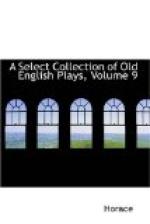VIS. The third’s a lesser room of purest
glass;
The fourth’s smallest, but passeth all the former
In worth of matter: built most sumptuously,
With walls transparent of pure crystalline.
This the soul’s mirror and the body’s
guide,
Love’s cabinet, bright beacons of the realm,
Casements of light, quiver of Cupid’s shafts,
Wherein I sit, and immediately receive
The species of things corporeal,
Keeping continual watch and sentinel;
Lest foreign hurt invade our Microcosm,
And warning give (if pleasant things approach),
To entertain them. From this costly room
Leadeth, my lord, an entry to your house,
Through which I hourly to yourself convey
Matters of wisdom by experience bred:
Art’s first invention, pleasant vision,
Deep contemplation, that attires the soul
In gorgeous robes of flowing literature:
Then, if that Visus have deserved best,
Let his victorious brow with crown be blest.
COM. SEN. Anamnestes, see who’s to come next.
ANA. Presently, my lord.
PHA. Visus, I wonder that amongst all your objects, you presented us not with Plato’s idea, or the sight of Nineveh,[266] Babylon, London, or some Stourbridge-fair monsters; they would have done passing well. Those motions, in my imagination, are very delightful.
VIS. I was loth to trouble your honours with such toys, neither could I provide them in so short a time.
COM. SEN. We will consider your worth; meanwhile, we dismiss you.
[VISUS leads his show about the stage, and so goeth out with it.
SCAENA ULTIMA.
AUDITUS, _&c_.
AUD. Hark, hark, hark, hark! peace, peace, O, peace! O sweet, admirable, swanlike, heavenly! hark, O most mellifluous strain! O, what a pleasant close was there! O fall[267] most delicate!
COM. SEN. How now, Phantastes! is Auditus mad?
PHA. Let him alone, his musical head is always full of old crotchets.
AUD. Did you mark the dainty driving of the last point, an excellent maintaining of the song; by the choice timpan of mine ear, I never heard a better! hist, ’st, ’st, hark! why, there’s a cadence able to ravish the dullest stoic.
COM. SEN. I know not what to think on him.
AUD. There how sweetly the plain-song was dissolved into descant, and how easily they came off with the last rest. Hark, hark, the bitter’st[268] sweetest achromatic.
COM. SEN. Auditus!
AUD. Thanks, good Apollo, for this timely grace,
Never couldst thou in fitter hour indulge it:
O more than most musical harmony!
O most admirable concert! have you no ears?
Do you not hear this music?
PHA. It may be good; but, in my opinion, they rest too long in the beginning.
AUD. Are you then deaf? do you not yet perceive
The wondrous sound the heavenly orbs do make
With their continual motion? hark, hark,
O honey-sweet!




